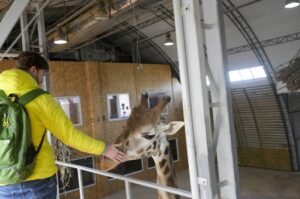Zoo animals in Ukrainian cities occupied by Russian Federation armed forces face shelling, short rations, and in some cases starvation and, if they’re lucky, evacuation to a NATO state, a series of news reports surveyed by Kyiv Post on March 28 said.
On March 8 RF mortar and small arms fire struck the Kharkiv “Ecopark” zoo, killing two workers attempting to feed animals, said MP Oleksandr Feldman, in an interview with the Bigmir.net news agency. Feldman still has his duties as a parliamentarian. He was a member of the Opposition Platform — For Life faction led by Viktor Medvedchuk until March 15, the day on which he left the parliamentary faction.
Artillery has also struck zoo premises repeatedly, hitting it on February 24 and on March 4, 10 and 16. The shelling has destroyed zoo buildings and smashed open cages housing primates and other animals, Feldman said, in an interview with the Kommentarii.ua news website. He said two kangaroos were killed on March 10.
Orangutans Vasya, Kuzya, Messi and Ponachka, as well as nine chimps were, according to Feldman, evacuated outside Kharkiv. Escaped animals thought to still be at large include two red wolves last seen on the city’s outskirts, while other survivors have found safety at Feldman’s home, the article said.
“My house turned into Noah’s Ark,” Feldman told Komentarii. “I have become a little Noah. In every room, in every corner, someone live there. In the pool there are marabou storks, turtles…I sleep next to monkeys, I have four boxes of animals at my feet.”
According to a March 12 Interfax news agency report, six lions, four tigers, an African wild dog and a troop of Capuchin monkeys at the Kyiv city zoo were evacuated to Poland in a six-day journey by convoy that, at times, placed the vehicles and animals in them under RF fire.
Volodymyr Topchy, the chief of Mykolaiv zoo, a city bombarded almost daily by RF forces for almost a month, said the facility has been repeatedly struck by RF artillery, including rockets dispersing cluster munitions – a devastating anti-personnel weapon banned by the Geneva Treaty.
Topchy in a March 23 FB post displayed images of cluster munition rocket remains littering the zoo premises. The weapon is banned by the Geneva Convention. Animals are highly stressed and unhealthy, due to the constant shooting, he said. Thanks to donations from the general public and foreign zoos, Topchy said, at present food is sufficient for the zoo’s animals, of which there are some 400.

This picture taken on March 22, 2022, shows a visitor caressing a giraffe at Mykolaiv zoo, southern Ukraine. (Photo by BULENT KILIC / AFP)
Managers at the privately-run Safari zoo, in the Azov port city Berdyansk, appealed to the general public for donations of money and food to support the park’s 80-animal collection, because otherwise some would starve, the local 061 news agency reported
RF troops overran Berdyansk on the third day of the war. In peacetime, the Safari Zoo is a popular holiday destination for young families taking package seaside vacations in the region.
Staff at Safari Zoo, home to a reported 80 species including big cats, are not receiving their salaries. The appeal said “We have never asked for help from the public before, we have always supported ourselves…but the animals must be fed. We are doing everything we can, but now, when Berdyansk is under temporary occupation, we can’t give them proper help to the animals. We beg you to save them.”
According to a February statement by Ukraine’s Ministry of Environmental Protection and Natural Resources, up to one third of all nature preserves in Ukraine are under RF control. Shelling, the emplacement of land mines, destruction of turf and low-lying areas by massed vehicle movement, explosions, fires and the construction of field fortifications threaten as much as 1.24 million hectares of government-managed forests, wetlands, and protected steppe, the statement said.
Ihor Belyakov, director of Odessa city zoo in south-west Ukraine, said in a Facebook statement that Odessites took advantage of recent warm weather and gone to the zoo en masse after news reports appeared that the Russian navy had given up plans to land marines in Odessa Region. Saturday’s attendance of more than 4,000 broke the zoo’s one day record, even though the facility was operating on a short schedule and open only from 09:00 to 15:00.
Link to donations for Kharkiv Ecopark: https://feldman-ecopark.com/en/donation/
Link to donations for Mykolaiv zoo: http://zoo.nikolaev.ua/en/news/rekvizity_zooparka
